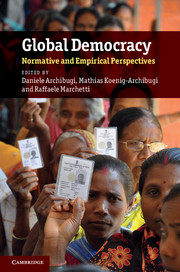Book contents
- Frontmatter
- Contents
- Figures
- Tables
- Notes on contributors
- Acknowledgements
- 1 Introduction
- 2 Models of global democracy
- 3 Citizens or stakeholders?
- 4 Is democratic legitimacy possible for international institutions?
- 5 Cosmopolitan democracy
- 6 Regional versus global democracy
- 7 Towards the metamorphosis of the United Nations
- 8 Flexible government for a globalized world
- 9 Global democracy and domestic analogies
- 10 Global democracy for a partially joined-up world
- 11 Civil society and global democracy
- 12 Global capitalism and global democracy
- 13 From peace between democracies to global democracy
- 14 The promise and perils of global democracy
- Index
- References
10 - Global democracy for a partially joined-up world
Toward a multi-level system of public power and democratic governance?
Published online by Cambridge University Press: 05 June 2012
- Frontmatter
- Contents
- Figures
- Tables
- Notes on contributors
- Acknowledgements
- 1 Introduction
- 2 Models of global democracy
- 3 Citizens or stakeholders?
- 4 Is democratic legitimacy possible for international institutions?
- 5 Cosmopolitan democracy
- 6 Regional versus global democracy
- 7 Towards the metamorphosis of the United Nations
- 8 Flexible government for a globalized world
- 9 Global democracy and domestic analogies
- 10 Global democracy for a partially joined-up world
- 11 Civil society and global democracy
- 12 Global capitalism and global democracy
- 13 From peace between democracies to global democracy
- 14 The promise and perils of global democracy
- Index
- References
Summary
Introduction
For many people throughout the world, the ideal of democracy is now accepted – at least in principle – as the pre-eminent source of political authority and legitimacy. Accordingly, as global-level systems of power, interconnection and organized political governance have expanded in recent years, the challenge of holding the exercise of power in global politics to democratic account has attracted increasing attention. Most commentators concur that increasing the democratic accountability of those wielding power in the global domain is in principle a desirable goal, and agree with proponents of ‘global democracy’ that the exercise of power at a global level – beyond the jurisdictional boundaries of democratic states – frequently suffers from significant and problematic ‘democratic deficits’.
Despite this widespread recognition of the need for further strengthening of democratic governance in global politics, the paucity of workable ‘blueprints’ for instituting democratic arrangements within the existing global order remains a key obstacle. History demonstrates that such ‘blueprints’ have often played a key role in interpreting, justifying and, in some cases, steering processes of institutional and ideational evolution. However, such abstractly devised reform programmes have often emerged in response to institutional developments driven in the first instance by the pragmatic experiments of ‘practical men’, searching for solutions to local problems of immediate importance to them.
- Type
- Chapter
- Information
- Global DemocracyNormative and Empirical Perspectives, pp. 183 - 209Publisher: Cambridge University PressPrint publication year: 2011
References
- 1
- Cited by

